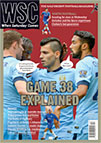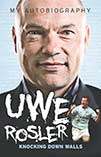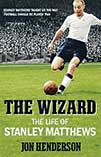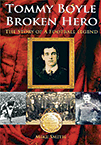Search: ' Berlin'
Stories
 With declarations of superiority and personal messages from leaders, Jon Spurling looks at why the 1934 meeting of England and Italy was as much about politics as football
With declarations of superiority and personal messages from leaders, Jon Spurling looks at why the 1934 meeting of England and Italy was as much about politics as football
In November 1934, world champions Italy arrived at a packed Highbury to face an England team containing seven Arsenal players: Wilf Copping, Ray Bowden, George Male, Frank Moss, Ted Drake, Eddie Hapgood and Cliff Bastin. Benito Mussolini had claimed “Good kicking is good politics” and described Italy’s World Cup victory the previous summer as a “triumph for fascism”. Although tempting to suggest that Italy were little more than a collection of 11 sporting soldiers, the England players were also expected to demonstrate the superiority of the Britisher.
 My autobiography
My autobiography
by Uwe Rösler & David Clayton
Trinity Mirror, £16.99
Reviewed by John Van Laer
From WSC 327 May 2014
Uwe Rösler is one of the best-known German footballers to have played in England but is widely regarded in his homeland as nothing more than a journeyman striker. Somewhat injury-prone and sporadically effective at various clubs in Germany before and after the fall of the Berlin Wall, Rösler’s cult status among Manchester City fans remains a mystery to those whose only memory of him is for playing in East Germany’s last-ever international fixture in 1990.
His autobiography is yet to appear in German (although each chapter has a title in his native language) but is certainly not just aimed at diehard City fans. As the title suggests, much of Knocking Down Walls deals with his childhood in East Germany and the opportunities afforded by the collapse of the communist system after 1989. He seems keenly aware of the important role in his personal development played by his years in the East German sporting system. Remarkably, neither of his parents were Communist Party members but that didn’t prevent the young Rösler from being offered a prized place in the academy system at Lokomotive Leipzig, one of the biggest names in East German football. Rigid discipline and pressure to succeed became part of daily life for all trainees, in a world where seniority was defined by the canteen tokens their performance merited rather than financial rewards.
However, Rösler’s temper and unwillingness to accept gradual progression to the first team in Leipzig resulted in his first managerial bust-up and a subsequent transfer to a lower-division team. Such impulsive behaviour became something of a feature of his career, colouring his image in Germany and flaring up most publicly in his outburst at then City manager Alan Ball, who had dropped Rösler from the starting XI for a Manchester derby.
His time in England certainly never featured anything as intimidating as being interviewed by the Stasi (East Germany’s secret police), who threatened to end his footballing career if he refused to become an informant. After this experience, Rösler rarely seems to have been fazed by any negative developments, not even the aggressive tumour in his chest that ended his playing career in Norway and left him with just a five per cent chance of survival.
Since recovering from cancer, his managerial career has described a gradual ascent – first at three clubs in the Norwegian top flight before being given the chance to return to English football at Brentford, a club for which Rösler seemed to have developed a real, and reciprocated, affection. One of the quirks of footballers’ autobiographies is that they often end on phrases such as “hopefully, we can really make things happen over the next few seasons” only for the author to move on shortly after publication. This book is no exception but Rösler’s departure was not acrimonious and his genial personality and professionalism won him many friends during his tenure at Griffin Park.
Indeed, the majority of chapters about his time playing and managing in England and Norway are written with great affection for his adopted homes. While much of his early career was very different to anything experienced by young professionals in England, there are sections of the book that follow a pattern common to many footballing autobiographies: anecdotes about favourite team-mates and unpopular managers, big matches and training ground incidents. However, the historical context and Rösler’s willingness to embrace challenges give Knocking Down Walls something a little different, and it will be interesting to see where his ambition and attitude can take him.
 The life of Stanley Matthews
The life of Stanley Matthews
by Jon Henderson
Yellow Jersey, £18.99
Reviewed by Harry Pearson
From WSC 316 June 2013
Stanley Matthews is one of those figures who looms so large in the consciousness of the nation there’s a tendency to think we already know all there is to know about him. The truth, which becomes apparent while reading Jon Henderson’s vivid biography, is that what most of us actually know about a player whose career spanned 29 seasons is confined to the salient facts about a couple of famous matches and a whole heap of the sort of cliches (including the one about how he always crossed the ball so that the laces didn’t hit the forward’s head) that were the 1960s equivalent of YouTube.
As you might expect, the truth, as it emerges in this well-researched and cannily written book, is more complex and interesting than the well-worn phrases about body swerve, dropping a cross on a postage stamp and the 1953 FA Cup final might have led us to expect. Matthews himself was a difficult character to read, on good terms with his team-mates yet always distant from them. Like many men of his generation and background he was not given to talking about his feelings, or to public displays of emotion. Even the obvious affection of football fans across the world could not draw him out. “He never interacted with the crowd,” Blackpool team-mate Jimmy Armfield recalls. “It just wasn’t his way.”
Matthews’s dribbling was so phenomenal that after one particularly spectacular run and goal against Belgium, the opposition players spontaneously applauded him as he ran back to the halfway line. Yet, for all the brightness he brought to the game, he was a rigid, almost Spartan figure – a non-drinker and non-smoker who sat quietly in the corner while his Stoke City team-mates were swigging beer from a hotel chamber pot, during surreptitious late-night sessions, and took cold showers before matches to help him focus. Locked in an unhappy marriage, frustrated by a succession of club and international managers who regarded him as a temperamental “show off” and by the financial constraints imposed by a job that, despite his celebrity, never paid him more than £20 a week, he clearly felt the strain. One day, sitting in a first-class railway carriage with his Stoke colleagues, he watched a luggage porter going about his work and remarked wistfully: “There’s something about normal life, isn’t there?”
As Henderson clearly demonstrates, whatever Matthews’s wishes – whether he was dazzling Hitler’s henchmen with a breathtaking display in Berlin following the shameful “Nazi salute” business, arguing bitterly over a loyalty bonus at Stoke, being reprimanded by the War Office for selling coffee on the black market in Brussels or eloping with “the true love of my life” Mila Winterova, a Czech who it emerged had once been a spy – his was a life that was destined never to be normal.
 The story of a football legend
The story of a football legend
by Mike Smith
Grosvenor House, £11.99
Reviewed by Alan Tomlinson
From WSC 306 August 2012
Until 2004, when Arsenal’s “Invincibles” went unbeaten through a full Premier League season, Burnley held the record for the longest undefeated run in a single season of England’s top tier. This small-town Lancashire club avoided defeat for 30 successive League games, going on to take their first championship in 1921. At the heart of this achievement was a gritty, combative Yorkshire-born midfield dynamo of Irish Catholic parentage, Tommy Boyle.
Mike Smith’s compellingly related and minutely researched biography of Boyle makes some of Burnley’s championship-winning heroes of 1960 look like pampered softies alongside this tough player, who dominated Burnley’s fortunes either side of the Great War. Boyle was a mere 5ft 7in but dominated the teams he led with a physical and psychological presence that willed his team-mates to victory. He cajoled, bullied and consistently inspired the players at Burnley, and before that at Barnsley, to the highest levels of competitive performance.
Boyle worked as a miner from the ages of 12 to 20, before signing professional terms for Barnsley. He took them to an FA Cup final against Newcastle, before a move to Burnley, who he led to Cup and League success. He was wounded in service in France, called back into action, then resumed the captaincy at Burnley, where eight of the 1914 Cup-winning team reunited for the 1920-21 triumph. For a time, Boyle had it all: the adulation of the “lasses” of the Lancashire mill-town (one of whom he married), money way beyond the reach of working men, the status of the local hero, acceptance and patronage of the local elite.
But the peak of 1921 was achieved in a climate of post-war industrial decline, and as his ageing body became less able to cope with the wear and tear of the top-flight game, his world fell apart. Fiery and brief spells as a trainer at Wrexham and then in Berlin were followed by the collapse of his marriage (after the tragic loss of an only child), unemployment and drink-fuelled aggression and violence. Boyle was committed to the local asylum under the new Mental Health Act of 1930, where he died after almost eight years of incarceration, aged 53.
This is a tragic story told well and with much revealing detail. Smith draws on an impressive range of sources in conveying this connection between the life of a community and the decline of one of its local heroes. The attribution of thoughts and reflections to Boyle is not always convincing, and some parts of the narrative are, as Smith concedes in a disclaimer, based on anecdote and the author’s imagination.
It is a long read, with match reports and lists of names that can jar the narrative flow. But Smith is to be congratulated for bringing alive a figure so typical of the fluctuating fortunes of early professional footballers, for whom the problems of adjustment after the glories of playing days so often proved insurmountable. Boyle’s story is no mere historical curiosity; reading this haunting tale, I was repeatedly reminded of Paul Gascoigne’s life after the magic was gone.